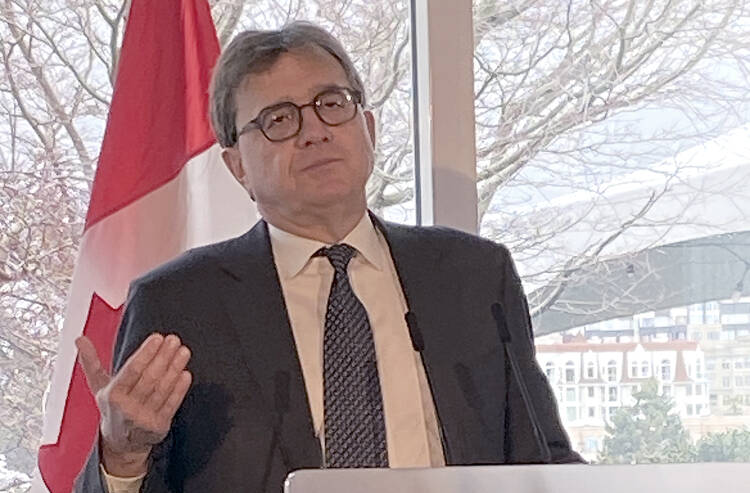There won’t be any oil and gas drilling rigs off British Columbia’s coast — at least not in the near future.
The last of 227 oil and gas exploration permits that once blanketed British Columbia’s coast from the entrance to Juan de Fuca Strait to Alaska over the past 50 years have been relinquished to the federal government.
Chevron Canada turned in 23 offshore permits on Feb. 9, reverting ownership to the Crown and leaving “zero permits” off the Pacific coast, Energy and Natural Resources Minister Jonathan Wilkinson said Wednesday at a news conference about salmon-habitat restoration.
In April 2023, Chevron Canada voluntarily relinquished 19 offshore oil and gas permits within protected wildlife areas on B.C.’s west coast. The permitting area surrendered by Chevron last year was estimated at 5,700 square kilometres and overlapped parts of federal marine protection areas off B.C.
Wilkinson said Chevron has not been compensated for relinquishing the latest 23 permits, which comprise an estimated 5,900 square kilometres off north Â鶹´«Ã½Ó³»Island and in Hecate Strait.
A provincial moratorium on offshore drilling has been in place since 1989, though it wasn’t considered legally binding.
“I think Chevron came to the conclusion there are other places in the world to do this kind of development and this wasn’t the most appropriate place,” Wilkinson said. “We welcome that decision by Chevron. I think most British Columbians are of the view that this is not the most appropriate place to do that kind of development and today we’re saying that will not happen.”
Ian Morin, a lawyer for Ecojustice Canada, called Chevron’s decision to relinquish the last of the permits “great news. “It significantly reduces the [environmental] risks that oil and gas drilling can have on the coast, particularly on environmentally significant areas.”
Environmental groups were celebrating last March when ExxonMobil gave up offshore oil and gas permits the company had held for more than 50 years.
Morin said ExxonMobil had been dropped from a federal court lawsuit filed by the David Suzuki Foundation and World Wildlife Fund in 2022 challenging the federal government’s continual renewal of the permits. The case was settled out of court.
The groups’ similar legal challenge against Chevron Canada had remained active, but now will likely be dropped, said Morin.
Calgary-based Chevron Canada said in a statement that it regularly evaluates its portfolio and had no plans to pursue development of the offshore permits.
It said it’s committed to “safely and responsibly” developing Canada’s onshore and offshore oil and gas resources. “Providing affordable, reliable and ever-cleaner energy is essential to an orderly energy transition that balances energy security, economic prosperity and environmental protection.”
Drilling companies have been sporadically searching for gas and oil off the coast since 1949, when minor deposits were found off Graham Island. Shell Canada started a drilling program in 1967, drilling 14 wells from Barkley Sound to Queen Charlotte Sound and Hecate Strait.
Non-commercial levels of oil were found off the Queen Charlotte Islands. Some gas was found off Tofino, but apparently not in the volumes to make it financially viable.
In 1969, Shell Canada leased its exploration rights to Chevron.
In the wake of the Exxon Valdez disaster in the spring of 1989, when an oil tanker ran aground and spilled 11 million U.S. gallons of oil, B.C. announced a drilling moratorium for at least five years.
Ottawa followed by saying it would not consider any offshore development until it was requested by the province.
Morin said challenging conditions to explore for oil, coupled with environmental disasters like the Exxon Valdez and later the Deepwater Horizon oil spill in the Gulf of Mexico, likely have oil companies looking for safer areas to extract fuel.
Morin noted that in Newfoundland, companies use platforms and have to drill so deep, “you might as well be drilling on the moon.”
Wilkinson said giving up the oil and gas permits in Pacific waters fulfils a condition in the federal government’s commitment to an Indigenous-led conservation initiative that received a pledge of $800 million from Ottawa two years ago.
He said several of the Chevron permits fell within a marine protected area, and along the boundary of the Great Bear Sea Project Finance for Permanence initiative.
The Great Bear Sea program was announced in 2022 as financial arrangement to support sound stewardship, management, job creation, and sustainable economic development and diversification across the Pacific region.
Wilkinson said the area sustains globally significant species, habitats and ecosystem values.
More than 50% of the entire Northern Shelf Bioregion has been identified by the Department of Fisheries and Oceans Canada through scientific assessments as having special biological or ecological significance, when compared with the surrounding ecosystem.
Wilkinson warned that while the current federal government would not entertain any new oil and gas permits, it could still happen under a Conservative government. “If Canadians were to elect Mr. Pierre Poilievre … I cannot speak to what he would do, but he is certainly a proponent of oil and gas development.”



